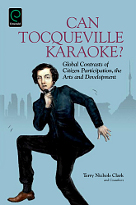Can Tocqueville Karaoke? Global Contrasts of Citizen Participation, the Arts and Development

This volume joins 10 others in the Research in Urban Policy series published by Emerald. Can Tocqueville Karaoke? brings together research traditions in classic democratic participation (as shaped by Alexis de Tocqueville) and innovation as a driver of economic growth (as propounded by Joseph Schumpeter and Jane Jacobs) to propose a framework for understanding how the two are interlinked.
In essence, the book explores how the arts and culture affect politics and the economy. The argument is that in recent decades, politics and economies have become more citizen-focused. This has been aided by the growth of the middle class and the explosion in information created by technological advancements. This, Clark argues, has increased the impact of cultural power, or “buzz”. Companies and governments alike are eager to harness buzz, in a world where a political song can challenge a government or a web comic can shape ideas about gender relations. Even the idea of artistic self-expression – the notion, especially in the YouTube era, that anyone can create an artwork – can lead people to believe in the legitimacy of their political self-expression.
The cases described in Can Tocqueville Karaoke? cover different countries and types of participation. These comparative studies show that context is crucial for determining how a mode of participation takes shape in a particular area. For instance, research on Seoul, Tokyo and Chicago shows that engagement in bohemian arts scenes is more associated with political progressivism in the US than in Korea and Japan. Two of the reasons are the US tendency toward individualism and neighbourhood zoning; without these, it may be harder to develop cultural scenes in Asian cities.
The type of cultural innovation described here has tended to develop in urban areas, as cities give rise to new ideas and exchange of ideas. And it has been seized upon by mayors as well as civil society. For example, in Bogotá, Colombia:
Mayors Mockus and Penalosa used entertainment and cultural activities to oppose corruption and cultural groups. They mobilized citizen support from above, by using cultural symbols and the media. In a drought, Mayor Mockus broadcast over TV from his bathroom, demonstrating how to take a shower and conserve water. Water consumption dropped dramatically. Corrupt cops were replaced by clown-like mimes, which made the streets look like a circus and cut traffic fatalities. They used the arts, popular culture, consumption, and entertainment activities as a powerful non-Tocquevillian path to build social cohesion and government legitimacy.
The links between culture and citizen engagement are complex and varied, as the assorted case studies in Can Tocqueville Karaoke? show. They suggest an overlapping area of research for political science, sociology, cultural studies, and urban studies.
Further reading:
Malone, Karen (2002), “Street life: youth, culture and competing uses of space”, Environment and Urbanization Vol 14, No 2, pages 157–168, available at http://eau.sagepub.com/content/14/2/157.abstract.
Markusen, Ann (2006), “Urban Development and the Politics of a Creative Class: Evidence from the Study of Artists”, Environment and Planning A Vol 38, No 10, pages 1921–1940, available at http://www.hhh.umn.edu/projects/prie/pdf/266_creativity_class_politics.pdf.
Book note prepared by Christine Ro
Search the Book notes database
Our Book notes database contains details and summaries of all the publications included in Book notes since 1993 - with details on how to obtain/download.
Use the search form above, or visit the Book notes landing page for more options and latest content.
For a searchable database for papers in Environment and Urbanization, go to http://eau.sagepub.com/

